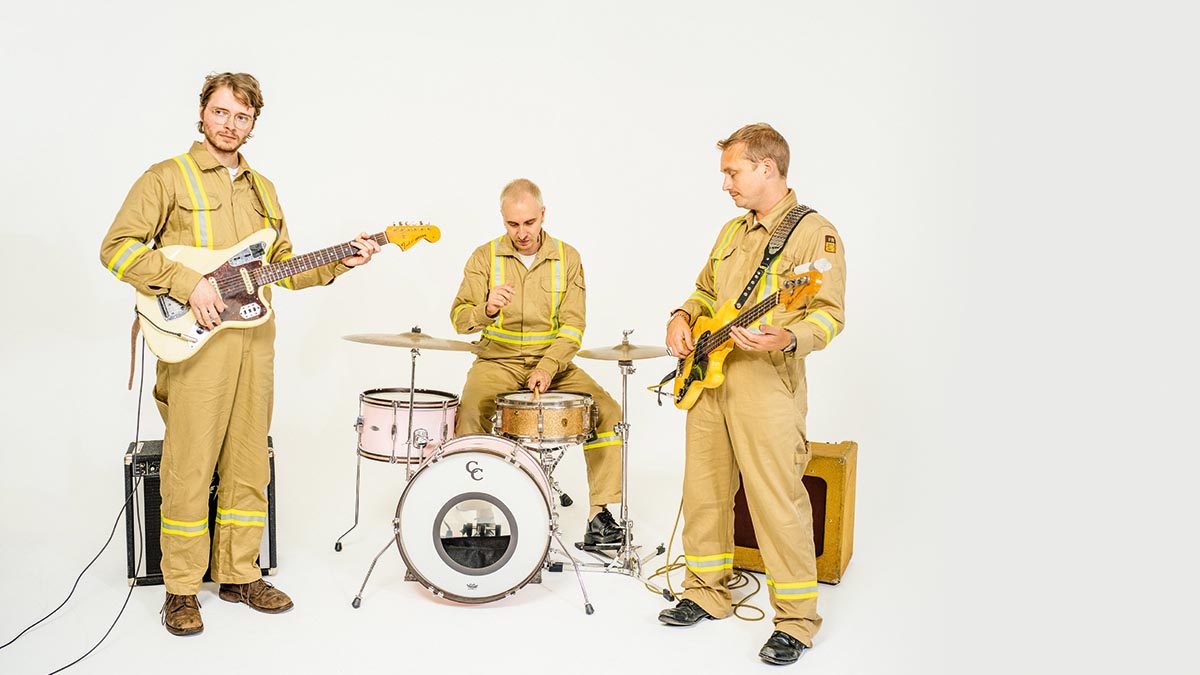“I used to not bend strings at all, but I started doing it as a joke to make my friends laugh when I played classic rock riffs – it became this massive part of my playing”: Omni’s Frankie Broyles on his unlikely journey to post-punk transcendence
Post-punk trio Omni are masters of minimalism, but guitarist Frankie Broyles is having fun with classic rock moves and ZZ Top-inspired tones

Frankie Broyles, the guitarist and leader of Omni, is a titan of post-punk minimalism in the modern era. He just didn’t plan it that way.
Before he formed Omni with bassist/vocalist Philip Frobos in 2011, Frankie had experienced mild regional success throughout the Atlanta area with indie rockers Balkans, and then served for two years with perpetually genre-confused legends Deerhunter.
It was only when he and Frobos began writing songs together that Frankie began channeling influences from post-punk legends such as Wire, Television and Talking Heads.
“I guess the stuff we were listening to lent itself to a minimalistic approach,” he says. “But we never intended to be a post-punk band; it just happened. We were listening to a lot of older bands, and even though we never meant to be post-punk, maybe it was inevitable.”
Following three outstanding albums in Deluxe (2016), Multi-task (2017) and Networker (2019), the new record Souvenir is aptly titled – primed to be a memento for the keepers of the flame and newbies alike. At the heart of it all is Frankie’s fretwork. And despite his calm demeanor, he is determined to push Omni to greater heights.
“The plan going forward is to keep trying to improve,” he says. “We want to improve with every song. That drives me to keep making music. Wanting to improve, and the idea of chasing the perfect song, while never catching it. I’ll keep chasing perfection, but I hope I never catch it because what would be the point, then? We’ll spread this music to a wider audience, and hopefully they’ll dig it as much as we do.”
What first drew you to post-punk?
Get The Pick Newsletter
All the latest guitar news, interviews, lessons, reviews, deals and more, direct to your inbox!
“When Omni started, I had been listening to many different things, like late-’70s and early-’80s post-punk stuff. I was into bands like Magazine, Wire, Devo, and things like that. I was drawn to the simplicity and the minimalistic guitar sounds. That has always appealed to me.”
Despite the guitars not being in your face, they’re apparent throughout Omni’s music. To expand on your attraction to minimalism, how do you view the guitar within the context of your music?
“Interesting question. The guitar in Omni songs is huge. It’s always the beginning of whatever we’re doing, meaning we’ll start writing a song, and I’ll have either a riff or we’ll have a simple bassline, and I’ll write something on top of that. And depending on where the guitar leads me, we’ll fit the bass and the drums into that.”
I noticed the unique rhythm aspect of your playing, so it makes sense that it’s intrinsically tied to the bass and drums.
“Yeah, I look at it like a puzzle. It’s like, ‘How do I make this work and sound good at the same time?’ But all the guitar work informs the drums, which is good because I also write all the drum parts. I use them as a tool to sometimes enhance the guitar parts. They’re very interlocked ideas and a lot of times, a melody will follow. So, the guitar, while not being over-the-top, is central to the entire process.”
Now that we’re looking at Omni’s fourth record, Souvenir, how have you evolved since the beginning?
“It’s hard to say, but I’m much less apt to put pressure on myself. I used to push hard to try and ensure everything was perfect, and because of that, recording stressed me out because I saw it as so final. Every song was just so… intense! It was very intense. But now, I’ve got a more relaxed approach where I’m more interested in experimenting and seeing what happens.”

Souvenir sounds free and easy, so shedding the ratcheted-up mindset seems to have served you well.
“I think so, too. I enjoy the recording process now, whereas before, I might have become too tied up with the idea of, ‘Is this the right decision?’ Or, ‘Should I do this or that?’ I’m more open now. I’m also more excited about things happening that I didn’t intend to.
“With Souvenir, I went into it with a fresh mindset as we hadn’t been working on music over the pandemic, and a couple of years passed. So, like you said, it was important for this to be free and easy but also more energetic. I wanted to be excited about the music, and I want to excite other people, too.”
But considering Networker received rave reviews, and then, to your point, the pandemic almost immediately shut you down, was there pressure to come back even stronger?
“Surprisingly, I didn’t feel any external pressure. I tried to be a relaxed songwriter, but I was still intense regarding the music. I felt Networker was subtle and mid-tempo, so maybe there was internal pressure for me to make Souvenir something more. I know I’m contradicting myself, but what I’m saying is time didn’t make me feel pressured. Maybe, in my mind, it was important for us to make a less introverted record with Souvenir.”
Looking at the first single Exacto, it features some classic angular guitar straight away. How did you dial in those sounds?
“I love [Fender] Jaguars. I’m pretty much always playing one! But another key piece of gear came when my friend came over with a Fender brown[-panel] Deluxe [6G3] clone. He built it over the pandemic, and it was great because it’s essentially a replica of the one ZZ Top used back in the day.
“I got into playing that because it has this classic and slightly overdriven tone that factored heavily into the sounds across the record, including Exacto. But the Deluxe aside, I also used a Music Man 112 [RD] and my EarthQuaker [Devices] Talons [High Gain Overdrive] a lot. I always have that pedal on unless I’m using the Deluxe clone because then I’d use the distortion from the amp.”
Double Negative is a standout track on the new album. How did that one come together?
“I am so happy to hear that, because it was one of the first tracks that I got excited about. So, Philip had a bass part, and we looked to create a sort of unified riff where we were both doing something that, aside from a couple of notes, was the same. We also wanted to be very minimal about it, like super minimal, to where we’re doing the same thing, and the only wrinkle is the speed of it.
“So, Double Negative came together over two nights and was the first actual song written for Souvenir. It gave us the energy to keep working, as the stuff we wrote before had us saying, ‘This is okay, but where is the passion?’ I’m glad you like that song because it was a turning point in this album’s writing process.”
Double Negative came together over two nights and was the first actual song written for Souvenir. It gave us the energy to keep working, as the stuff we wrote before had us saying, ‘This is okay, but where is the passion?’
Is Double Negative the best representation of the guitarist you are today?
“Hmm, I don’t know about that. If I had to pick, I would go with Compliment. That’s one where I incorporated some string bends, which have become a thing for me. I used to not bend strings at all, but I started doing it as a joke at live shows to make my friends laugh when I played classic rock riffs! Once I started doing it, it became like this massive part of my playing, and at the end of Compliment, you can hear it.”
Were there any moments while recording Souvenir where you put down the Jaguar and reached for another guitar?
“I tried, but it was hard! Our producer Kris Sampson had a custom Telecaster that his brother-in-law made him, and it was a really nice guitar. I don’t know if I recorded with it, but I did mess around with it.
“But one guitar I did use – I just don’t remember on what song – is this custom Mustang that a guy here in Atlanta made me. But with the Jag, I’ve got two that I’ve been using for years: one from ’97 and another from 2002, which are Japanese-made. But I used this Jag that Kris had in the studio from ’65, which sounded terrific. That surprised me, and it made me realize that I’ve been playing mine hard for years, and both need fret work and to be serviced!”
I got this cool G&L on Craigslist for $250. I didn’t use it much on the record, but I probably did some writing on it. It’s a fantastic guitar and fun to play
Deluxe clone and the ’65 Jag aside, were there any additional gear discoveries that impacted the album?
“I got this cool G&L on Craigslist for $250. I didn’t use it much on the record, but I probably did some writing on it. It’s a fantastic guitar and fun to play. I’ve always liked G&L guitars, and for the longest time, I wanted one of those ASATs from the ’80s and ’90s with the cool black textured plates and stuff.”
What’s your secret to proper post-punk guitar?
“When I’m writing guitar parts, I keep pushing to come up with ideas until I find something I react to. I search for an emotional reaction or stuff that sticks in my head. And often, if I come up with something that I like, but it’s not there yet, I’ll do another track over it, and try to find whatever feeling it’s lacking. And then later, when we’re learning the songs, we have to try and figure out how to play both simultaneously!”
And finally, what advice would you give young players?
“Try always to be the best representation of yourself that you can be. And don’t be afraid to get out and experiment with notes, sounds, and rhythms. I look at writing songs and guitar parts like putting a puzzle together, and that can be tough, so it’s always important to remember to try and have fun doing it.”
- Souvenir is out February 16 via Sub Pop.
Andrew Daly is an iced-coffee-addicted, oddball Telecaster-playing, alfredo pasta-loving journalist from Long Island, NY, who, in addition to being a contributing writer for Guitar World, scribes for Bass Player, Guitar Player, Guitarist, and MusicRadar. Andrew has interviewed favorites like Ace Frehley, Johnny Marr, Vito Bratta, Bruce Kulick, Joe Perry, Brad Whitford, Tom Morello, Rich Robinson, and Paul Stanley, while his all-time favorite (rhythm player), Keith Richards, continues to elude him.
“His songs are timeless, you can’t tell if they were written in the 1400s or now”: Michael Hurley, guitarist and singer/songwriter known as the ‘Godfather of freak folk,’ dies at 83
“The future is pretty bright”: Norman's Rare Guitars has unearthed another future blues great – and the 15-year-old guitar star has already jammed with Michael Lemmo










